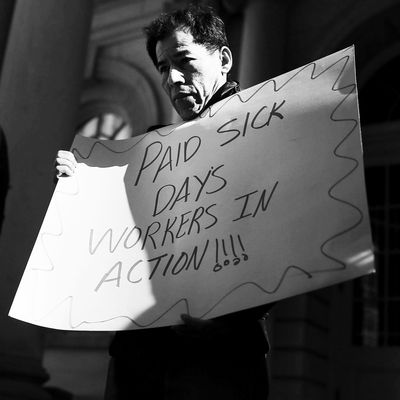
Please note the story you’re reading was published more than a day ago. COVID-19 news and recommendations change fast: Read the latest here to stay up-to-date. We’ve lifted our paywall on all essential news and updates about the coronavirus.
As more and more cases of coronavirus are confirmed in the United States, government officials are advising people to work from home and avoid large gatherings. For tens of millions of people, however, that isn’t really an option — they must choose between staying home from work if they feel ill and receiving a paycheck.
Universal guaranteed paid sick leave should have been the law of the land long ago, and the growing number of COVID-19 cases within our borders has made its realization that much more urgent; the practice of withholding pay from sick employees looks especially cruel and illogical against the backdrop of a potentially deadly global outbreak. In situations that require quarantine, those who can’t work from home — food-service workers, truck drivers, retail workers — will need to take time off. Without paid leave, the consequences for them could be severe.
There’s little public infrastructure or precedent to prepare for what comes next, and the state of paid sick leave for workers in the United States is woefully inadequate. Unlike in most other wealthy, powerful countries, there is no federal law requiring employers to give it to their workers. According to the U.S. Bureau of Labor Statistics, more than 32 million workers don’t have any paid sick days. Low-wage workers are less likely to have paid sick time and access to healthcare or other medical benefits. In fact, a staggering 69 percent of workers in the 10th lowest percentile of medium income do not receive any paid sick leave at all. Only 12 states require employers to offer paid sick leave, but these mandates tend not to apply to independent contractors, who constitute a growing share of the workforce.
In response to the pandemic, some progressive policymakers have called for universal paid sick leave to become the new standard, and many more Democrats are trying to push emergency measures through Congress. On Friday, Democratic senator Patty Murray and Democratic congresswoman Rosa DeLauro introduced legislation that would provide seven days of paid sick leave to workers, as well as an additional 14 days in the case of a public-health emergency, including the current crisis. And on Sunday, Democratic congressional leadership Nancy Pelosi and Chuck Schumer put forth another proposal that would, among other things, require workers who quarantine or are responsible for caring for children impacted by school closures receive paid leave. (President Trump has yet to speak on whether he supports the measure, though he’s suggested rolling back the payroll tax to zero by the end of the year, which would be of greater benefit to higher-income workers and would be of no help whatsoever to workers who are laid off.)
Without a federal mandate to protect workers amid the outbreak, employees are at the mercy of the corporations they enrich with their labor. The response from these entities has been largely unimaginative, limited, and slow. Some companies have begun to take action, like the country’s largest private employer, Walmart, which implemented an emergency leave policy for its 1.4 million hourly workers that stipulates they can receive up to two weeks paid leave if they need to be quarantined or are diagnosed with COVID-19. Darden Restaurants, which operates Olive Garden and other dining establishments, responded with a plan to hasten the rate at which workers accrue sick leave, resetting their policy at an hour leave for every 30 hours worked. The policy applies retroactively to workers’ last 26 weeks, for those who qualify.
Other companies that employ massive numbers of people who can’t satisfy the requirements of their jobs from home have been unmoved by the global crisis. CBS News reports that McDonald’s maintains its right to make employees earn up to five days of paid time off a year, with exceptions made for workers at corporate-owned locations that need to be quarantined for 14 days. The latter policy does not account for the 90 percent of McDonald’s restaurants around the world that are run by independent franchises.
So far, the paid sick leave plans on offer from a handful of the nation’s largest employers reflect policy that should have been in place on the federal level all along. If workers can’t perform because they are sick or might make others sick, they should be allowed to recover without worrying about pay being withheld from them. Passage of mandatory sick leave would be a victory under our current system, and still it would be a moral minimum. The outbreak keeps raising questions about how we are conditioned and obligated to care for one another in this country. If money were not the barrier to care and therefore tantamount to receiving it, how much suffering and death could be spared?

